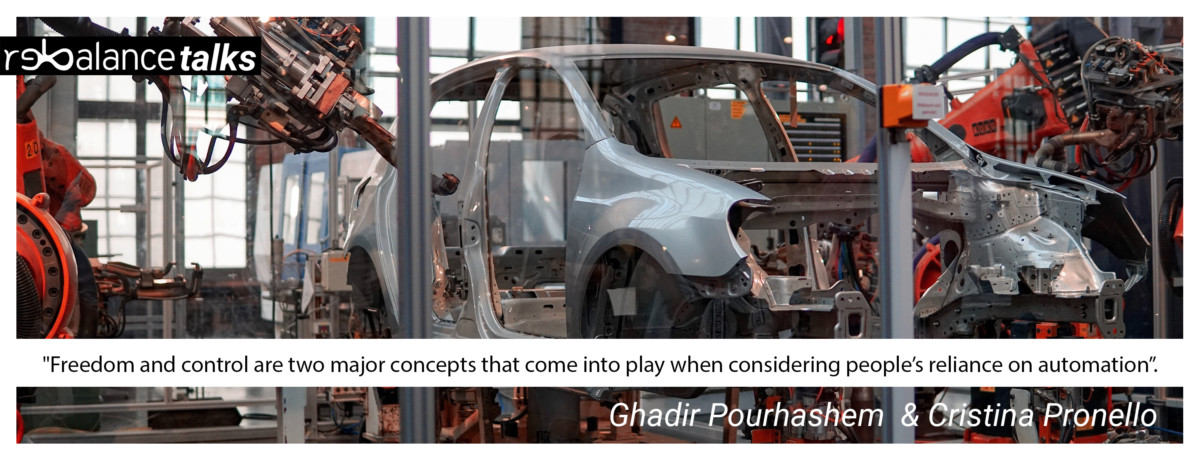
In the first Rebalance Dialogue, Andrea Ricci moderated a conversation between Ghadir Pourhashem and Cristina Pronello about how Automated vehicles (AV) are expected to release people from the technical constraint of driving and allow people to do multiple tasks at the same time.
Under the assumption that a cultural shift is needed before the massive adoption of AV, REBALANCE has identified, among others, a variety of ingrained cultural and value-driven attitudes that is likely to play a fundamental role in the future of AV, beyond their technological performance: fear of innovation, fear of privacy breaches, fear of losing control, impoverishment of the human dimension of the travel experience, and ethical issues.
During the conversation, many questions arose about whether and how to address these factors in order to impel people towards cultural shifts that would facilitate the uptake of AV. Forceful policies or nudges might initiate a slippery slope towards the dangers of an “ethical state”.
The discussants agreed that freedom and control are two major concepts that come into play when considering people’s reliance on automation. Passivity can easily be associated with a diminished experience of freedom or loss of control. One of the most exploited arguments to overcome and compensate for this distrust is the alleged increase in road safety.
The promised environmental benefits of driverless vehicles often come by the hand of shared mobility. This innovative duo might become a successful symbiotic couple or, on the contrary, this partnership could hinder their diffusion.
According to the participants, the impact of vehicle automation on social inclusiveness remains uncertain. Further isolation and alienation cannot be ruled out. The paragon of the currently observed effects of COVID-19 on mobility choices might be valid once dictated whether they are transitory or permanent.
Regarding the technological aspect and the scepticism to adopt new technologies because of lack of experience (or knowledge), the doubt in the minds of the participants appeared when considering that most technologically innovative solutions for social and environmental sustainability are mainly patching problems created by previous technological innovation. Technologies are created for doing business and not for solving problems. AV or Electric vehicles are just an attempt by the automotive sector to stay alive. Until the identification of the outset of technological progress that intrinsically leads us to sustainability, current prevailing values (such as efficiency, speed, cost savings, technological progress “per se”) perpetuate this headlong flight. The integration of technological progress will have to deal with two sets of goals, which are incompatible, or at least partly in contrast with one another: to increase speed and efficiency (cost, energy, time…); to increase comfort, safety and quality of life.
The younger generations are shifting priority values, but it is not clear yet how this translates into the adoption of technological innovation and, particularly in the case of AVs.
Then the conversation dealt with several topics regarding AV reliability such as misconceptions and incoherence about the use of time in AV/public transport. In that sense,
the rejection of AV might not be related to fear of innovation but to the impossibility to reproduce human thinking and moral decisions that bring no confidence in the machine. Socialisation and conviviality thanks to AV goes with many question marks (gender, age gap).
In the domains of privacy and personal data, we might find privacy issues with personal data and sharing technologies. Unfortunately, no data are publicly available for innovations and research.
Aspirational values come into play when recognizing that the most important trip one person does is associated with emotion and pleasure. Therefore, the pleasure of driving or the preference for driving oneself can also be related to fear to change habits. There could be a confrontation between improvement of quality of life versus optimisation and misperceived opinions as facts. Maybe social inclusion will not come by sharing.
Governance raised different points in the dialogue such as confidence of the public in policy-makers, the way of presenting to the public possible options (data, conclusions…) and targeted nudges.
Finally, other factors agreed by the discussants that could hinder the adoption of new technologies are accidents and failures of self-driving vehicles, the fear of innovation, and ethical issues.
Related content
Benjamin Docquir
Benjamin Docquir Relevant [...]
Cristina Marolda
Cristina Marolda Publications [...]
Stefan Gössling
Stefan Gössling Journal [...]
Jens Schade
Jens Schade Books [...]
Cristina Pronello
Cristina Pronello Relevant [...]
Xavier Tackoen
Xavier Tackoen Relevant [...]

Andrea Ricci is a recognised foresight expert who is highly regarded for his knowledge on sustainability policy analysis, impact assessment and forward-looking analyses, with particular emphasis on public policy.

Dr. Ghadir Pourhashem is a senior researcher and project manager in the Department of International Research Projects (ERAdiate+) at the University of Žilina in Slovakia, he joined ERAdiate (FP7 pilot ERA Chair) in March 2017. He has spent several years of his career and education in researching and consulting activities at the national and European level through collaborating in several national and EU-funded projects (FP7, H2020, Interreg) mostly in the field of transportation planning and sustainable mobility with various international groups since 2004.

Cristina Pronello is a Full Professor at Politecnico di Torino, at Interuniversity Department of Regional and Urban Studies and Planning, where she coordinates the TRIS (Transport Research for Innovation and Sustainability) research group and she is an expert of SmartData@PoliTO – Big Data and Data Science Laboratory. Until November 2019, she was a Full Professor at Sorbonne Universités – UTC, where she was Chairholder of “Intelligent Transport Systems and Territorial Dynamics” and she is still affiliated to the AVENUES laboratory.






